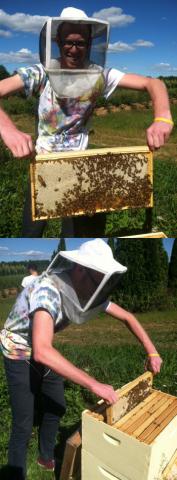Protecting Pollinators
Started in 2011, Rider’s honeybee colonies represent a great student initiative that provides educational and environmental opportunities for our campus and beyond. Bees impact the environment in remarkable ways. By providing pollination services, bees support native plants and make our crops productive (especially at the nearby Green Acres garden plot). Honey, produced by bees using pollen and nectar, keep the hive going and can provide natural sweeteners for us. Bees’ communal lifestyle and foraging behavior provide educational opportunities for biologists, sociologists, and behavioral neuroscientists and students in a variety of classes can study these bees and their behavior. Although honeybees are not native, they have come to play important roles in our food production system – did you know that almost a third of all crops require bee pollination?
A bee colony is held together by its queen, who lays eggs and controls the colony’s behavior. After hatching, bees take on different jobs in a hive, feeding developing larvae, cleaning and defending the hive, and eventually foraging for pollen and nectar outside. A bee’s lifespan depends on the time of year, living several months over the winter, but only surviving a few weeks in the summer as the bee population in a hive turns over rapidly.
The bee club, made up of students, faculty and staff working in collaboration, maintain the bees, keep the hives healthy, and will harvest honey once the hives get large and strong enough. Look for honey at the Thursday garden giveaways in the near future!
Previous Stop: Beckett Village | Next Stop: Waste Management




